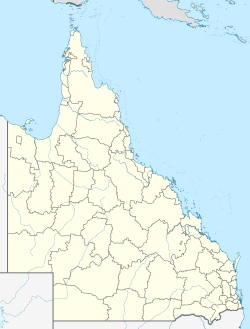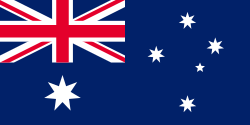Charleville (Queensland)
| Charleville | |||||||
|---|---|---|---|---|---|---|---|
 | |||||||
| |||||||
| |||||||
| |||||||
| |||||||
| Charleville | ||||||||||||||||||||||||||||||||||||||||||||||||
|---|---|---|---|---|---|---|---|---|---|---|---|---|---|---|---|---|---|---|---|---|---|---|---|---|---|---|---|---|---|---|---|---|---|---|---|---|---|---|---|---|---|---|---|---|---|---|---|---|
| Klimadiagramm | ||||||||||||||||||||||||||||||||||||||||||||||||
| ||||||||||||||||||||||||||||||||||||||||||||||||
Charleville ist eine Stadt im Bezirk Murweh Shire, im australischen Bundesstaat Queensland.
Sie befindet sich im Südwesten von Queensland, 758 km westlich von Brisbane, der Hauptstadt des Bundesstaates. Charleville ist mit 2.551 Einwohnern[1] die größte Stadt und auch Hauptstadt des Verwaltungsbezirks Murweh Shire, welcher 40.700 km² umfasst.[3] Charleville liegt an den Ufern des Warrego River, an dem der Warrego Highway endet.
1922 richtete Qantas zwischen Charleville und Cloncurry die zweite regelmäßig operierende Fluglinie Australiens ein. Dies war zugleich Qantas erste Fluglinie.
In Charleville gibt es einige denkmalgeschützte Gebäude. In der Wills Street befindet sich das im Jahr 1929 fertiggestellte Hotel Corones.[4] Der örtliche Bahnhof in der King Street, das ehemalige Gebäude der Queensland National Bank in der Alfred Street und das Charleville War Memorial in der Edward Street wurden ebenfalls unter Denkmalschutz gestellt.[5][6][7]
Söhne und Töchter der Stadt
- Richard Bell (* 1953), Künstler
Weblinks
Einzelnachweise
- ↑ a b Charleville. 2021 Census Quickstat. Australian Bureau of Statistics, 28. Juni 2022, abgerufen am 26. März 2023 (englisch).
- ↑ Bureau of Meteorology, Australia: Klimainformationen Charleville. World Meteorological Organization, abgerufen am 6. April 2012.
- ↑ Murweh. 2021 Census Quickstat. Australian Bureau of Statistics, 28. Juni 2022, abgerufen am 26. März 2023 (englisch).
- ↑ Hotel Corones, Charleville. Queensland Government, 20. Januar 2016, abgerufen am 21. Januar 2021 (englisch).
- ↑ Charleville Railway Station. Queensland Government, 20. Januar 2016, abgerufen am 21. Januar 2021 (englisch).
- ↑ Queensland National Bank (former). Queensland Government, 20. Januar 2016, abgerufen am 21. Januar 2021 (englisch).
- ↑ Charleville War Memorial. Queensland Government, 20. Januar 2016, abgerufen am 21. Januar 2021 (englisch).
Auf dieser Seite verwendete Medien
Flag of Australia, when congruence with this colour chart is required (i.e. when a "less bright" version is needed).
See Flag of Australia.svg for main file information.State flag and government ensign (internal waters only) of Queensland.
FIAV 110010.svg:
Autor/Urheber: NordNordWest, Lizenz: CC BY-SA 3.0 de
Positionskarte von Queensland, Australien
Dining room of the Hotel Corones, ca. 1930. The dining room of the hotel has a feature sideboard on the far wall which has stained glass features. This sideboard is still part of the dining room today. All the tables are covered with white cloths and set with place settings and napkins. An Art Deco light fitting is hanging from the ceiling in the far corner.
Autor/Urheber: Chris Olszewski, Lizenz: CC BY-SA 4.0
Charleville railway station, Queensland, 2024
Autor/Urheber: Christallkeks, Lizenz: CC BY-SA 3.0
The Hotel Corones in Charleville, Queensland, Australia, as seen from the town's main street in September 2014.
Queensland National Bank in Charleville — in 1915.
- The Queensland National Bank, at 87 Alfred Street, was erected in 1888. This was the second building for the bank, the first branch being opened in October 1881. The architect was F. D. G. Stanley and the builder was A. Anderson. The cost was about 2000 pounds. In 1942 the bank moved to new premises in Alfred Street.
- The building is now the Historic House Museum, an historic house museum in Australia, run by the Charleville District Historical and Cultural Sociey.
- (Description supplied with photograph).
War memorial at Charleville, ca. 1939. Charleville is the largest town in South West Queensland and has a population of approximately 3300 people. It is a rich pastoral area and was first explored by Edmund Kennedy in 1847. Charleville was named by Surveyor W. Tully for his hometown in Ireland. Cobb and Co established their largest and longest running coach making factory in Charleville in 1886 and the railway line was connected from Brisbane in 1888. Charleville was one of the first airports used by Qantas to fly paying passengers to Longreach in 1922. It is also home to the Royal Flying Doctor Service and the Charleville School of the Air.












